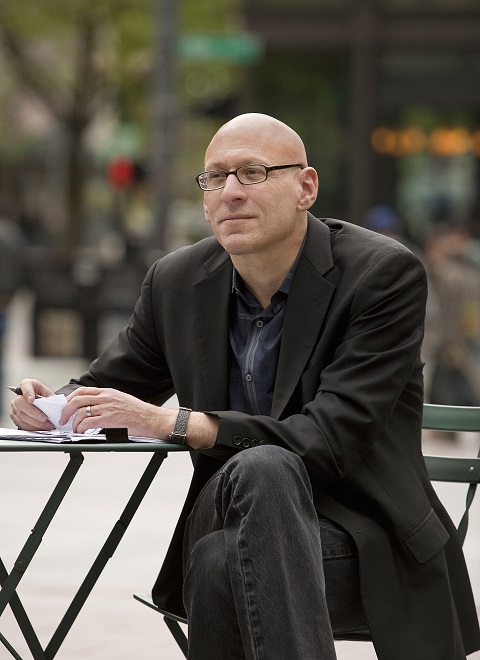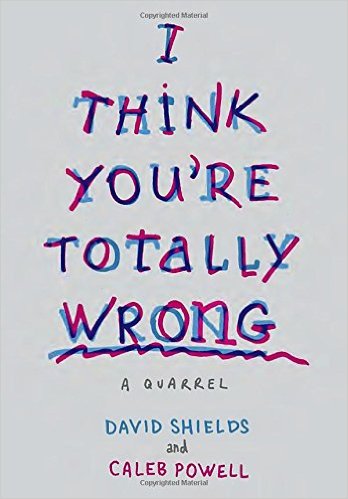Interview: David Shields
 Midwestern Gothic staffer Stephanie Mezzanatto talked with renowned author David Shields about his influences, creating a dialogue book, his interest in a “Midwestern take” on things, and more.
Midwestern Gothic staffer Stephanie Mezzanatto talked with renowned author David Shields about his influences, creating a dialogue book, his interest in a “Midwestern take” on things, and more.
**
Stephanie Mezzanatto: What’s your connection to the Midwest?
David Shields: I lived in Iowa City from 1978-1983, and my wife, Laurie, is originally from Lake Forest, Illinois (we met at the Ragdale artists’ colony in Lake Forest in 1986). I’m extremely interested in a “Midwestern” take on things, which I define in one essay this way: “Hemingway’s hometown of Oak Park is about twenty miles southwest of [Bill] Murray’s hometown of Wilmette; both men have or had a gimlet-eyed view of the disguises the world wears. It’s more broadly Midwestern, though, than only Hemingwayesque, I think. Dave Eggers, who grew up in Lake Forest, has it. So does Laurie, who grew up in the same North Shore suburb. Johnny Carson, who was raised in Nebraska, and David Letterman, who was raised in Indiana, also have it—a quality of detachment that’s a way of not getting sucked in by all the shit sent your way, of holding onto some tiny piece of yourself that’s immune to publicity, of wearing indifference as a mask.”
SM: I Think You’re Totally Wrong: A Quarrel cleverly explores the two differing viewpoints of you and your longtime friend and former student, Caleb Powell, on a variety of important issues, including religion, marriage, sex, literature, art, politics, and life, in an entertaining and thought-provoking way that engages the reader, and calls for a thorough examination of one’s own views. Were there any challenges you both faced while bridging the gap between having a open debate with a friend and targeting a larger audience in text?
DS: Thanks, Stephanie. Glad to hear you find the book thought-provoking. You’ve captured the dilemma well; Caleb and I are talking to each other, but we’re also trying to create a book. The original transcript was perhaps five times longer than the final book, so the conversation went into every nook and cranny, whereas the book is a curation and transformation of the raw transcript.
SM: Do you think your time at the Iowa Writer’s Workshop influenced the views you hold today, that we see represented in I Think You’re Totally Wrong: A Quarrel?
DS: I would say a lot of my work over the last twenty-plus years has been in rather direct opposition to the Workshop aesthetic of traditional, linear, realistic fiction. I learned a lot at the Workshop, but mainly  what I learned was to reject what I was learning.
what I learned was to reject what I was learning.
SM: You co-authored I Think You’re Totally Wrong: A Quarrel with Caleb Powell, and throughout your career you have written both solo and collaboratively. How is the experience of co-authoring a book different for you from writing on your own?
DS: I don’t see that much difference, to be honest; when I’m writing a book solo, I argue against myself; when I’m collaborating with someone (such as Caleb), I’m arguing against him. I like the way collaboration creates a tension in me—a demand for new writing every time I get a fresh email from my collaborator.
SM: What inspired this unique book-in-dialogue? Did the idea for writing I Think You’re Totally Wrong: A Quarrel come after the trip with Powell to the cabin in Washington’s Cascade Range, or did you both have the idea in mind when you began your retreat and the conversational debates that occurred while there?
DS: I wanted to create a dialogue book; I’ve always loved the form—from Plato’s Dialogues to Car Talk. I tried a few people and finally found traction with Caleb; we drive each other crazy, but we share a grammar and rhetoric. We went to the cabin specifically to write the book. We knew from the beginning it was a debate about life and art.
SM: Where and/or how do you find inspiration to write? What advice would you give to budding writers?
DS: My inspiration is that as a kid I had a horrible stutter; I relish the chance to be able to talk, now, on the page. Advice? Write about what you can’t shut up about (to paraphrase Gordon Lish).
SM: What author(s) have had the greatest influence on your own style and your journey as a writer? Who are your currently reading?
DS: Influences: Heraclitus. Pascal. Rousseau. Cioran. Adler. Augustine. Bernhard. Barthes. Bennett. Biss. Bouillier. Borges. Burton. Calle. Carson. Castle. Cheever (journals).Coetzee. Connolly. Daudet. Ernaux. Fusselman. Simon Gray. Spalding Gray. Hunt. Kelman. Leiris. Manugso. Markson. Montaigne. Nelson. Nietzsche. Pessoa. Patterson. Rochefoucauld. Schopenhauer. Sterne. Wenderoth. Currently Reading: Heidi Julavits (The Folded Clock) and Hervé Guibert (Mausoleum of Lovers).
SM: What’s next for you?
DS: Just out: That Thing You Do With Your Mouth (McSweeney’s, June 2015). Also working on film version of my book Black Planet. The film version of Totally Wrong is done and will be, I hope, distributed nationally next year.
Here is a link to the trailer for the film: https://www.google.com/#q=trailer+shields+powell+franco
**
David Shields is the internationally bestselling author of twenty books, including Reality Hunger (named one of the best books of 2010 by more than thirty publications), The Thing About Life Is That One Day You’ll Be Dead (New York Times bestseller), and Black Planet (finalist for the National Book Critics Circle Award). Forthcoming are War Is Beautiful (powerHouse, September 2015), Flip-Side (powerHouse, 2016) and Other People (Knopf, 2017). The recipient of Guggenheim and NEA fellowships, Shields has published essays and stories in the New York Times Magazine, Harper’s, Esquire, Yale Review, Village Voice, Salon, Slate, McSweeney’s, and Believer. His work has been translated into twenty languages.






